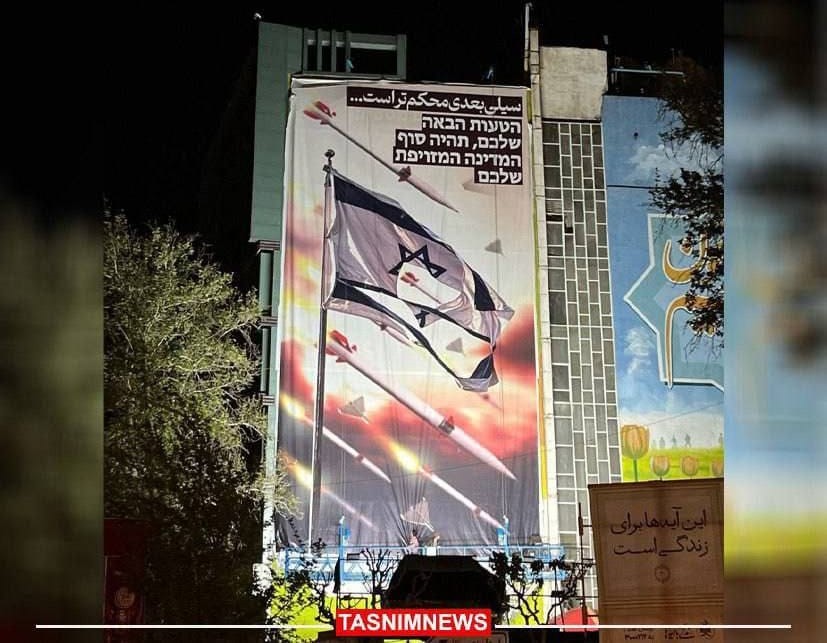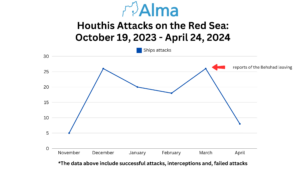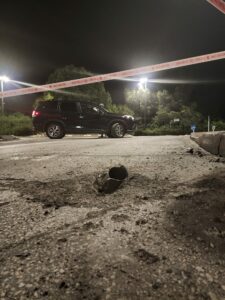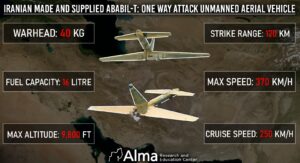Gidi Harari and Sarit Zahavi
Overnight on April 13–14, a dramatic event of strategic, technological, and political significance for the State of Israel unfolded. Firstly, the ‘head of the snake’ was unmasked, forcing Iran to respond directly for the first time since the start of the CBW (the Campaign Between Wars – the low-profile campaign to disrupt Iranian regional entrenchment), rather than through proxies. Proxy warfare is the modus operandi that Iran had been accustomed to, and has preferred for many years.
Israel, intentionally or unintentionally (it doesn’t really matter), presented the Iranian leadership with a challenge that forced it to respond directly.
The attack in Damascus and the elimination of a very senior Islamic Revolutionary Guards Commander – Mohammad Reza Zahedi – in his office adjacent to the Iranian embassy in Damascus left the Islamic Republic with no other choice.
This followed the reported killing of 18 Iranian generals in Syria in operations attributed to Israel since the opening of the northern front against it by Iranian proxies.
Another Iranian response via proxies would have been perceived as a sign of weakness and cowardice by the satellite organizations of the IRGC – among the Iran-backed Shi’ite militias across the Middle East, with Hezbollah foremost among them.
In fact, the Iranian regime was left with no choice but to respond decisively in an attempt to demonstrate military and technological prowess, which Iran has been boasting of for years, and to prove to Iranian allies that Tehran too is prepared to contribute its part to the ‘struggle’ of ‘the Islamic resistance’ (Al-Muqawama Al-Islamiyah), when the Iranians are attacked and insulted in a painful manner.
This occurred despite the basic logic of Iran, which saw it invest heavily in building proxy militias in the Middle East, which could have effectively managed a campaign against Israel and the Western presence in the region, while keeping Iran itself out of the fray.
Secondly, the extraordinary and unique capability of the multi-layered Israeli air defense system, talked about for so many years (for better or worse) and never operationally challenged to the full until now. The system’s extraordinary capabilities were revealed to the Israeli and international public.
This capability is utterly unique in the world and has undoubtedly contributed significantly to strengthening the Israeli image on the one hand and renewing Israeli public trust in the defense establishment on the other, the importance of which should not be underestimated since the events of October 7. This represents a significant contribution to Israel’s national resilience.
Thirdly, the Iranians managed to stir up, bring to the forefront, and challenge the strategic alliance between Israel and the free world and the regional partnership – ties that had not yet been tested on such a scale.
The strategic alliance between Israel and the United States plays a crucial role in securing the future of the State of Israel as a Jewish, democratic, liberal, Western, and powerful entity in a Middle East, a region that is increasingly being conquered by a regional power with a radical and dark Shi’ite Islamic agenda, which is increasingly endangering Western states as well.
The Israeli – American alliance is largely the key to Israel’s ability to turn around its eroding international status (including in the United States itself) and obtaining legitimacy for the war it is conducting against radical Islam on all fronts.
The night of April 14 therefore presents a unique and singular opportunity. Israel must fully exploit it.
Meanwhile, at the regional level, over the years, public and covert strategic relations have gradually been built between Israel and the Sunni-Arab states in the area, who also see the Iranian threat as a clear and immediate danger to their own security.
On April 14, Israel’s inclusion in CENTCOM proved itself as an additional step for building precious security cooperation between Israel and the Sunni-Arab states.
The ability to intercept 99% of the rockets is also thanks to the cooperation in the domain of air defense with Jordan, Saudi Arabia, and other Gulf states, over which a significant part of the Iranian projectiles passed.
Therefore, the time is right to advance normalization with Saudi Arabia, which will also bring a significant change in relations with Jordan (a country threatened by Iran both directly and indirectly, more than Israel), a normalization rooted in shared interests more than shared values.
In our world, however, historically, peace agreements and normalization arrangements were signed and maintained not out of love but from a commonality of interests that must be nurtured and preserved over time.
It is time for Israel to listen to its friends and allies, reward them for their exceptional stand by its side, and allow the United States to lead the coalition towards a possible arrangement with Saudi Arabia.
In the Arab Middle East, the Bedouin have a saying: “I took my revenge after 40 years, and even then I hurried too much.”
This should now guide Israel against Iran. Retaliation against Iran will come, but for now it is not the top item on the priority list, and there is no need for it to come in the form of pillars of fire and smoke.
At this time, there are more pressing priorities: Securing the return of the Israeli captives and defeating Hamas.
Retaliation can be very painful, even when it occurs in less overt ways. Israel has the tools to do this.
Israel needs to send a message now that the response will be at a time and place that is convenient for it. Such a message will also have the added advantage of keeping the Iranians in a state of uncertainty over time.
In conclusion, now is the time to address the real threat to the State of Israel from outside, by building international and regional ties that will support an offensive (not just defensive) effort against the Iranian threat, targeting both its conventional capabilities that threaten Israel’s population, and the development of unconventional nuclear or chemical weapons.
Gidi Harari is a research fellow at the Alma Center and an IDF reserves lieutenant colonel. He served for many years in the Military Intelligence Directorate and is an expert on Lebanon and security challenges.






